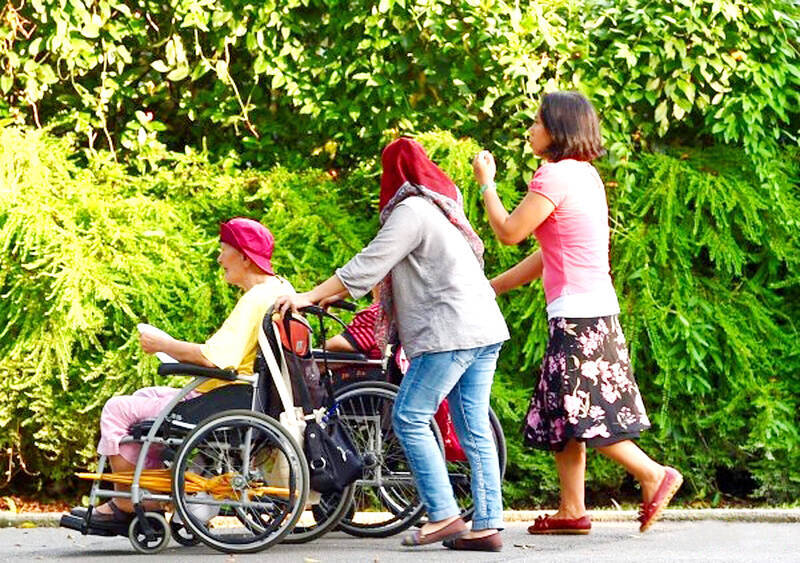With Taiwan expected to become a “super-aged society” next year, the government plans to introduce the Long-term Care 3.0 program in the first half of next year to provide elderly people with more comprehensive care and allow home caregivers to have a breather, Vice Premier Cheng Li-chiun (鄭麗君) said on Friday.
Cheng in a media interview said that a cross-ministerial long-term care task force under the supervision of the Executive Yuan is working out the details of the plan, with the new program expected not only to take care of more elderly people, but also integrate local healthcare services with welfare mechanism to build a complete long-term national care system.
SUPER-AGED SOCIETY

Photo: Taipei Times
The WHO defines a super-aged society as one in which 20 percent of the population is aged 65 or older, while an “aged society” is one in which 14 percent of the population is aged 65 or older, and an “aging society” is one in which 7 percent of the population is in this category.
According to the definitions, Taiwan became an aging society in 1993, and an aged society in 2018. Next year, the country would become a super-aged society.
President William Lai (賴清德) in his inauguration speech on May 20 spoke about the goal of achieving a “healthier Taiwan.”
To achieve it, the government has put measures in place such as the Long-term Care Plan 3.0 to strengthen care services for elderly people by increasing the number of care facilities and integrating national healthcare and welfare resources.
Since former president Tsai Ing-wen (蔡英文) unveiled the Long-term Care Plan 2.0 in 2016, the budget and the number of service providers and venues that provide such care have increased significantly, Cheng said.
In the past three years, the percentage of people needing care who have received care has been on the rise as the government intensified efforts to provide services. Last year, the ratio was 80.19 percent, up from 69.51 percent in 2022 and 56.60 percent in 2021.
Taiwan has set a goal of serving 87 percent of people who need care over the next four years by improving its long-term care services.
As part of the Long-term Care Plan 2.0, Taiwan has set up a greater number of venues in many neighborhoods to provide home care, dining and health promotion services, Cheng said.
REDUCING BURDEN
The Long-term Care Plan 3.0 would focus on families that need to take care of their members with severe illness, as they shoulder a heavier financial burden, Cheng said, adding that the upcoming plan would provide diversified and continued care for these groups.
Cheng said she has seen critically ill people being discharged from hospitals, but soon being rushed back to emergency rooms, as their illness deteriorated and family members encountered difficulties taking care of them.
Many people admitted into caregiving institutions frequently return to hospital, which places a psychological strain on the families, Cheng said, adding that it is the government’s responsibility to strengthen the healthcare network so that people receive high-quality care whether at home or in a caregiving institution.

Taiwan is gearing up to celebrate the New Year at events across the country, headlined by the annual countdown and Taipei 101 fireworks display at midnight. Many of the events are to be livesteamed online. See below for lineups and links: Taipei Taipei’s New Year’s Party 2026 is to begin at 7pm and run until 1am, with the theme “Sailing to the Future.” South Korean girl group KARA is headlining the concert at Taipei City Hall Plaza, with additional performances by Amber An (安心亞), Nick Chou (周湯豪), hip-hop trio Nine One One (玖壹壹), Bii (畢書盡), girl group Genblue (幻藍小熊) and more. The festivities are to

Auckland rang in 2026 with a downtown fireworks display launched from New Zealand’s tallest structure, Sky Tower, making it the first major city to greet the new year at a celebration dampened by rain, while crowds in Taipei braved the elements to watch Taipei 101’s display. South Pacific countries are the first to bid farewell to 2025. Clocks struck midnight in Auckland, with a population of 1.7 million, 18 hours before the famous ball was to drop in New York’s Times Square. The five-minute display involved 3,500 fireworks launched from the 240m Sky Tower. Smaller community events were canceled across New Zealand’s

‘IRRESPONSIBLE’: Beijing’s constant disruption of the ‘status quo’ in the Taiwan Strait has damaged peace, stability and security in the Indo-Pacific region, MOFA said The Presidential Office yesterday condemned China’s launch of another military drill around Taiwan, saying such actions are a “unilateral provocation” that destabilizes regional peace and stability. China should immediately stop the irresponsible and provocative actions, Presidential Office spokeswoman Karen Kuo (郭雅慧) said, after the Chinese People’s Liberation Army (PLA) yesterday announced the start of a new round of joint exercises around Taiwan by the army, navy and air force, which it said were approaching “from different directions.” Code-named “Justice Mission 2025,” the exercises would be conducted in the Taiwan Strait and in areas north, southwest, southeast and east of Taiwan

UNDER WAY: The contract for advanced sensor systems would be fulfilled in Florida, and is expected to be completed by June 2031, the Pentagon said Lockheed Martin has been given a contract involving foreign military sales to Taiwan to meet what Washington calls “an urgent operational need” of Taiwan’s air force, the Pentagon said on Wednesday. The contract has a ceiling value of US$328.5 million, with US$157.3 million in foreign military sales funds obligated at the time of award, the Pentagon said in a statement. “This contract provides for the procurement and delivery of 55 Infrared Search and Track Legion Enhanced Sensor Pods, processors, pod containers and processor containers required to meet the urgent operational need of the Taiwan air force,” it said. The contract’s work would be